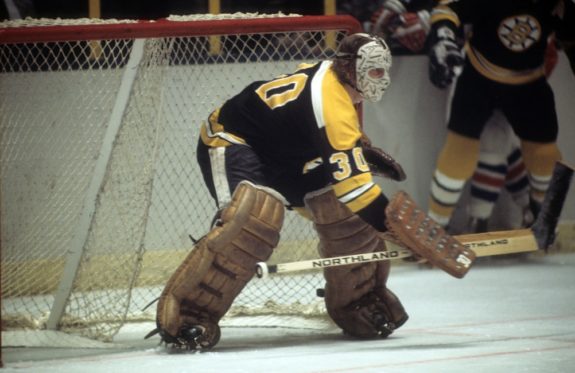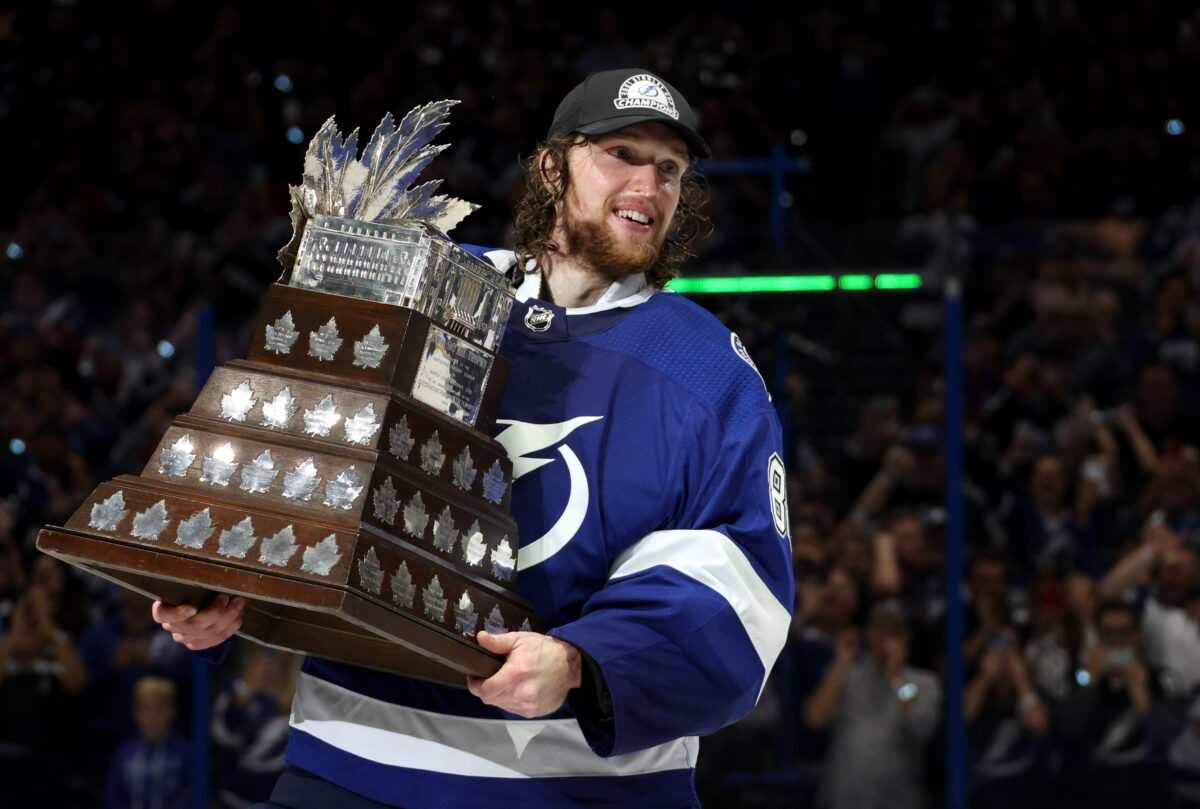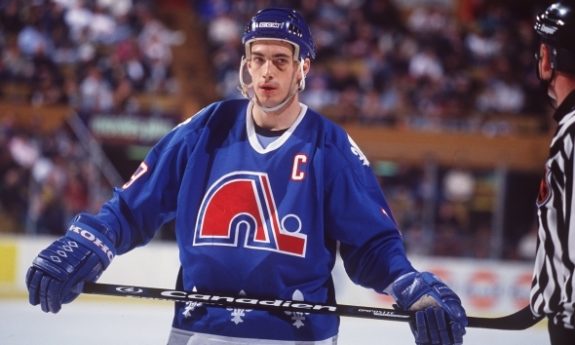Yesterday in Hockey History: July 6
Tomorrow in Hockey History: July 8
July 7 is a significant date in National Hockey League history as a pair of signings made it easier for players from Europe to come over, forever changing the game. There were also a handful of coaching moves and the birth of a Hall of Famer beloved in the Mile High City. Finally, to put a bow on the day, a Stanley Cup was raised and a rare NHL Draft took place in Montreal. Let’s take our daily trip through time to relive all the best this date has had to offer.
Devils Pave the Way
On July 7, 1989, the New Jersey Devils held a press conference to introduce their two newest additions; defensemen Viacheslav Fetisov and Sergei Starikov, both from the Soviet Union. These signings were instrumental for the influx of players from Russia and all over Europe into the NHL.
Before Fetisov came over, a Russian player would have to defect from the Soviet Union in order to play in the NHL. That meant they could no longer play for the international team, which was the ultimate goal for every player in the Soviet Union. Fetisov was able to broker a deal, after years of negotiations, which allowed him to leave to come to North America, but not defect so he can still play in international events.
Fetisov, who spent 13 seasons playing for CSKA Moscow before coming to the NHL, was originally drafted by the Montreal Canadiens in 1978. He re-entered the draft in 1983 and was taken by the Devils in the eighth round. He finally made his North American debut at the age of 31.
He played 341 games for the Devils before being traded to the Detroit Red Wings late in the 1995 season. The veteran played another 205 games for the Red Wings and was part of their back-to-back Stanley Cup championships in 1997 and 1998.
His post-hockey career was just as impressive. After retiring in 1998, he returned to New Jersey as an assistant coach, helping them win the 2000 Stanley Cup. From there, he was the general manager of the 2002 Russian Olympic team that won the bronze medal. In 2009, he became the president of CSKA Moscow. When his team was ravaged with injuries, he played the final handful of games of the 2009-10 season at 51.
Starikov was drafted by the Devils in the eighth round of the 1989 NHL Entry Draft. He was not originally targeted to bring over, but once he expressed his interest, the Devils worked out a deal to sign him as well. Starikov only played in 16 NHL games for the Devils, but he spent time in both the American Hockey League (AHL) and International Hockey League (IHL) before retiring after the 1992-93 season.
New Coaches Hired
Veteran goalie Gerry Cheevers announced his retirement on July 7, 1980, and was named as the new head coach of the Boston Bruins. He replaced general manager Harry Sinden, who coached the final seven games of the previous regular season and their playoff run after firing Fred Creighton.

Cheevers had quite a bit of regular-season success with the Bruins and led the team to the best record in the league during the 1982-83 season. He made it to the Stanley Cup playoffs in all four of his full seasons but only made it as far as the conference final just once. He was let go 56 games into the 1984-85 season, with Sinden taking over again. His 204 wins are the fifth-most in franchise history.
On July 7, 1983, Jack Evans was named the new head coach of the Hartford Whalers, replacing John Cuniff. He went 163-174-37 in his four and a half seasons behind the bench. Only Paul Maurice and Peter Laviolette have won more games than Evans in franchise history.
The Colorado Avalanche hired Joel Quenneville as their new head coach on July 7, 2004. He replaced Tony Granato, who remained a member of Quenneville’s staff. He finished each of his three seasons as a coach with exactly 95 points but never made it past the second round of the playoffs.
He was not retained following the conclusion of their 2008 postseason run. Quenneville joined the Chicago Blackhawks as a scout the following September. Just over a month later, he replaced Denis Savard as head coach and eventually led them to three Stanley Cup wins in 2010, 2013, and 2015.
Lightning Win Stanley Cup For Second Year in a Row
On July 7, 2022, the Tampa Bay Lightning became a modern dynasty by winning their second Stanley Cup championship in a row after shutting out the Canadiens 1-0 on the strength of Ross Colton‘s second-period goal and a 22-save shutout by Andrei Vasilevskiy. The Bolts secured the Cup in five games while the Habs went home after a Cinderella run that saw them beat the Toronto Maple Leafs, Winnipeg Jets and Vegas Golden Knights en route to a Western Conference championship.
At the end of the game, the Conn Smythe Trophy was awarded to Vasilevskiy after he recorded a 1.90 goals-against average (GAA) and .937 save percentage (SV%) along with five shutouts in his 23-game run to his second Stanley Cup. With the win, the Lightning became the ninth team to repeat as champions and the first since the Pittsburgh Penguins in 2016 and 2017.

Nikita Kucherov could have easily won the Conn Smythe as well, becoming the sixth player in NHL history to lead the postseason in points without a tie in consecutive seasons and the first since Mario Lemieux for the Penguins in 1991 and 1992. He ended the playoffs with 32 points (eight goals, 24 assists) after scoring 34 (seven goals, 27 assists) in 2020.
Brayden Point also became the sixth player in NHL history to lead the playoffs in goals without a tie in consecutive seasons (14 goals in 23 games each season). All in all, a purely dominant performance by the Lightning all around.
Odds & Ends
The Blackhawks named Tommy Ivan general manager on July 7, 1954, replacing Bill Tobin. He had spent the previous seven seasons as the head coach of the Red Wings, winning three Stanley Cups. Ivan remained on the job for the next 25 years before also serving as vice-president and alternate governor. The Blackhawks won the 1961 Stanley Cup and made trips to the Stanley Cup Final in 1962, 1965, 1971, and 1973 under his guidance.
Future Hall of Fame defenseman Mark Howe signed with the Red Wings on July 7, 1992. Mark, of course, was the son of the legendary Gordie Howe, who was the franchise’s greatest player. Howe was recognized as one of the best two-way defensemen of his era.
Mark played in 122 games over his three seasons in Detroit before retiring after a trip to the 1995 Stanley Cup Final. While he wasn’t nearly as productive as he was earlier in his career, he positively influenced some of the Red Wings’ younger blueliners, like Nicklas Lidstrom.
On July 7, 2022, the first round of the 2022 NHL Draft took place in Montreal where the host Canadiens held the first overall pick. They went off the board and selected Slovak winger Juraj Slafkovsky instead of the consensus choice Shane Wright – who fell to the Seattle Kraken at fourth overall. Rounding out the top three were Simon Nemec (New Jersey Devils) and Logan Cooley (Arizona Coyotes). It was also the first in-person event since 2019 after the 2020 and 2021 Drafts were held virtually due to the COVID-19 pandemic.
Happy Birthday to You
The greatest player in Quebec Nordiques/Avalanche history, Joe Sakic, was born on July 7, 1969. His long working relationship with the franchise began when he was drafted by the Nordiques in the first round (15th overall) of the 1987 NHL Entry Draft.
Sakic scored 234 goals and 626 points during his first 508 NHL games in Quebec before relocating to Colorado. Once in Denver, he scored another 391 goals and 1015 in 870 games for the Avalanche. He captained two Stanley Cup-winning teams in 1996 and 2001. He won the Conn Smythe Trophy for being the most valuable player of the 1996 postseason. He was awarded the Hart Trophy as the league’s most valuable player for the 2000-01 season.

In 2011, two years after retiring as a player, Sakic returned to work for the Avalanche. He was originally brought on as an executive advisor and alternate governor. He was promoted to Executive Vice President of Hockey Operations in May 2013. He was officially named general manager on Sept. 19, 2014, and is now the President of Hockey Operations.
Other notable players also born on this date include Ed Staniowski (70), Tony Hrkac (59), and Patrick Lalime (51).
*Originally constructed by Greg Boysen
